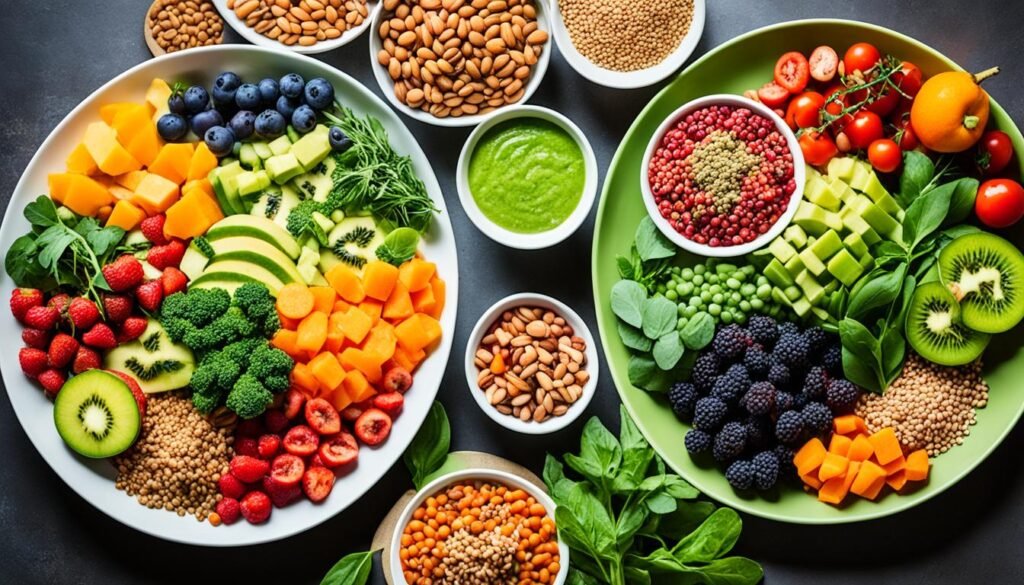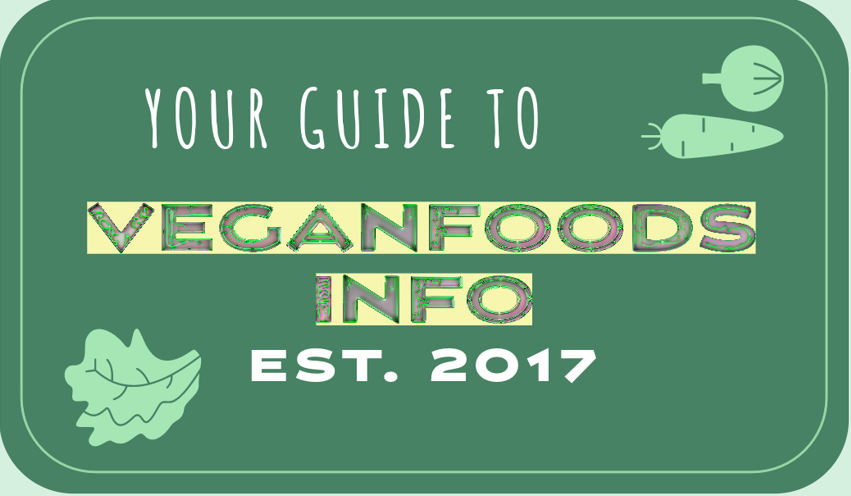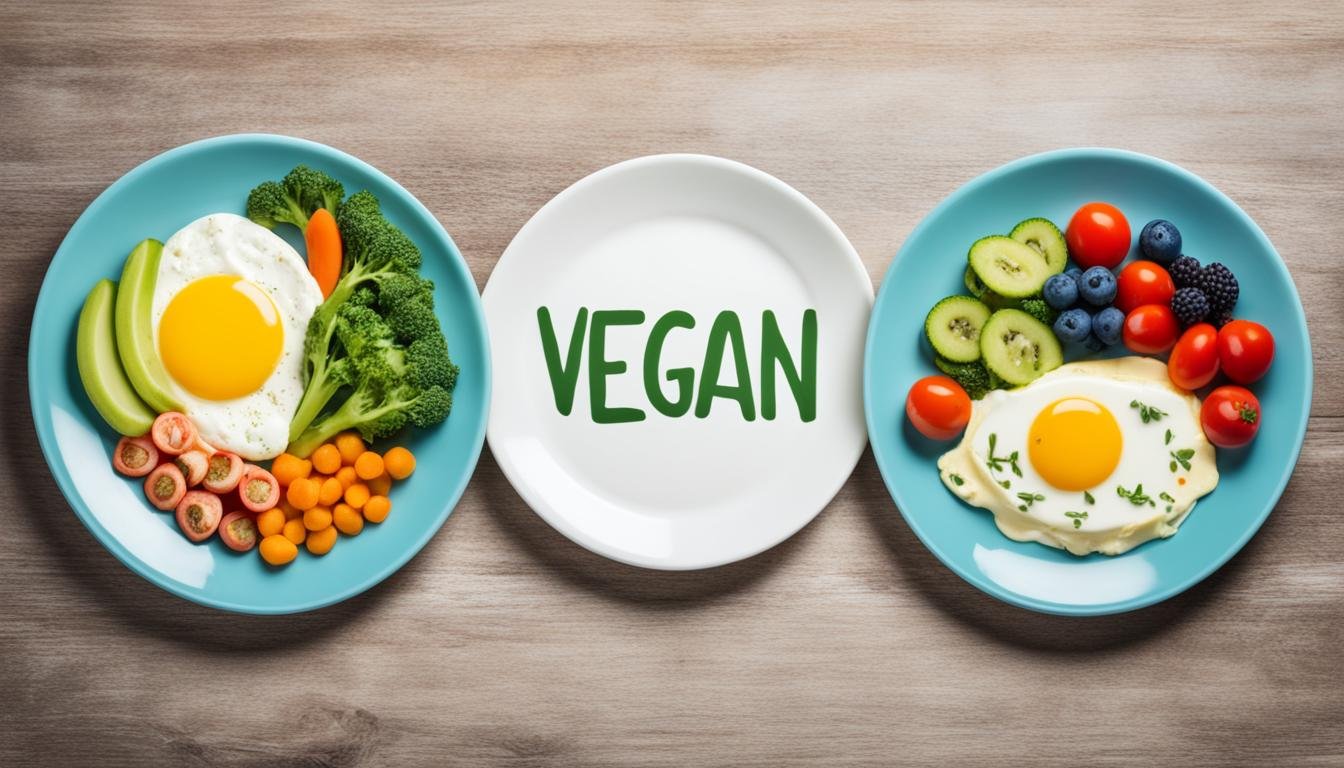Welcome to our comprehensive guide on the differences between a vegan and vegetarian lifestyle. Whether you’re considering adopting one of these dietary choices or simply curious about the distinctions, we’ve got you covered. In this article, we’ll explore the variations between veganism and vegetarianism, their diets, health benefits, and provide a helpful comparison to assist you in making an informed decision.
Veganism and vegetarianism have become increasingly popular in recent years, fueled by ethical, environmental, and health concerns. While both lifestyles share similarities in terms of excluding meat, poultry, and seafood from their diets, the differences lie in the extent of their dietary choices.
If you’re looking for a diet free from all animal products, including meat, dairy, eggs, and honey, then veganism is the way to go. Vegans strive to minimize harm to animals and often choose this lifestyle with a strong focus on ethics and sustainability.
On the other hand, vegetarians abstain from eating meat but may include dairy, eggs, and honey in their diet. This dietary choice is often driven by personal health reasons, religious beliefs, or environmental concerns. Variations of vegetarianism exist, allowing individuals to tailor their diets to meet their specific needs.
Throughout this article, we’ll delve deeper into the dietary choices, health benefits, and potential challenges associated with both lifestyles. By the end, you’ll have a clear understanding of the distinctions between veganism and vegetarianism, helping you make an informed decision that aligns with your values and goals.
What is a Vegan?
In the world of dietary choices, veganism stands out as a distinct and compassionate lifestyle. A vegan meticulously excludes all animal products from their diet, embracing a plant-based approach that extends far beyond food choices. By adhering to a vegan lifestyle, individuals commit to forgoing not only meat but also dairy, eggs, and even honey.
A vegan diet emphasizes whole foods derived solely from plants, including fruits, vegetables, grains, legumes, nuts, and seeds. This conscious decision goes beyond personal health benefits and extends to ethical and environmental considerations.
Adopting a vegan lifestyle is often motivated by a deep sense of compassion for animals. Vegans firmly believe in minimizing the harm inflicted upon all living beings, recognizing their rights and inherent worth. Additionally, the environmental impact of animal agriculture plays a significant role in this decision, as vegans seek to reduce their carbon footprint and mitigate the negative effects of livestock farming on our planet.
Ultimately, being vegan is more than just a diet; it’s a profound commitment to living in harmony with nature, cultivating compassion, and making conscious choices for the betterment of the planet and all its inhabitants.
| What a Vegan Avoids | What a Vegan Includes |
|---|---|
| Meat | Fruits and vegetables |
| Dairy | Whole grains |
| Eggs | Legumes |
| Honey | Nuts and seeds |
What is a Vegetarian?
In this section, we will define what it means to be a vegetarian. A vegetarian is someone who abstains from consuming meat, including poultry, fish, and seafood. However, unlike vegans, vegetarians may include certain animal byproducts in their diet, such as dairy, eggs, and honey, depending on their specific preferences and beliefs.
There are different types of vegetarians, each with its own variations in dietary choices:
- Lacto-vegetarians: Lacto-vegetarians exclude meat, fish, eggs, and poultry from their diet but consume dairy products.
- Ovo-vegetarians: Ovo-vegetarians exclude meat, fish, dairy, and poultry but consume eggs.
- Lacto-ovo vegetarians: Lacto-ovo vegetarians exclude meat, fish, and poultry but consume both dairy products and eggs. They are the most common type of vegetarians.
- Pescatarians: Pescatarians mainly follow a vegetarian diet but include fish and seafood in their meals.
- Flexitarians: Flexitarians predominantly follow a vegetarian diet but occasionally include meat or fish in their meals.
Vegetarianism is often motivated by ethical, environmental, and health considerations. Many individuals choose a vegetarian lifestyle to reduce their ecological footprint, alleviate animal suffering, or improve their overall well-being.
Benefits of a Vegetarian Lifestyle
By adopting a vegetarian diet, individuals can enjoy a wide range of health benefits:
- Reduced risk of chronic diseases: Numerous studies have shown that vegetarian diets, rich in fruits, vegetables, whole grains, and legumes, can lower the risk of heart disease, high blood pressure, type 2 diabetes, and certain types of cancer.
- Weight management: Vegetarian diets are often lower in calories and saturated fats, making them an effective approach for weight management and maintaining a healthy body weight.
- Improved digestion: Plant-based diets are naturally high in fiber, which promotes healthy digestion and helps prevent constipation.
- Better nutrient intake: Vegetarians tend to consume higher levels of essential nutrients such as vitamins C and E, magnesium, potassium, and dietary fiber.
Additionally, vegetarian diets have shown positive impacts on the environment, helping to reduce greenhouse gas emissions, promote sustainable land use, and conserve water resources.
| Benefits of a Vegetarian Lifestyle | Description |
|---|---|
| Reduced risk of chronic diseases | Vegetarian diets are associated with a lower risk of heart disease, high blood pressure, type 2 diabetes, and certain types of cancer. |
| Weight management | Plant-based diets are often lower in calories and saturated fats, making them effective for weight management. |
| Improved digestion | The high fiber content of vegetarian diets supports healthy digestion and prevents constipation. |
| Better nutrient intake | Vegetarians consume higher levels of essential nutrients like vitamins, minerals, and dietary fiber. |
Whether motivated by ethical, environmental, or health reasons, embracing a vegetarian lifestyle can have numerous positive impacts on both individuals and the planet.
Dietary Choices and Restrictions
When it comes to dietary choices, vegans and vegetarians have specific preferences and restrictions that shape their eating habits. Both diets focus on plant-based foods, but they differ in terms of animal product consumption.

Sources of Nutrients and Proteins
While vegan and vegetarian diets predominantly consist of plant-based foods, their sources of nutrients and proteins vary. Vegetarians often include dairy products, eggs, and honey in their diet, which provides them with additional protein and calcium. On the other hand, vegans rely solely on plant-based sources for these nutrients.
Plant-based protein sources for vegans and vegetarians include:
| Vegan Protein Sources | Vegetarian Protein Sources |
|---|---|
| Legumes (such as lentils, chickpeas, and beans) | Legumes (such as lentils, chickpeas, and beans) |
| Soy products (such as tofu, tempeh, and edamame) | Soy products (such as tofu, tempeh, and edamame) |
| Nuts and seeds (such as almonds, walnuts, chia seeds, and hemp seeds) | Nuts and seeds (such as almonds, walnuts, chia seeds, and hemp seeds) |
| Quinoa | Quinoa |
| Seitan | Seitan |
Potential Deficiencies and Challenges
Vegans and vegetarians need to pay attention to potential deficiencies and challenges that may arise from excluding certain animal products from their diet.
Vegans, for instance, may need to ensure an adequate intake of vitamin B12, which is primarily found in animal foods. They might also need to supplement their diet with iodine, omega-3 fatty acids (like DHA and EPA), and iron. Additionally, sourcing enough calcium without dairy products can be a challenge, but it is possible through fortified foods and plant-based milk alternatives.
Vegetarians, on the other hand, generally have fewer challenges as they can consume dairy products and eggs, which provide additional nutrients. However, they still need to be mindful of getting a variety of protein sources and ensuring sufficient iron intake.
In summary, both the vegan and vegetarian diets offer a range of nutrient-rich plant-based foods, but they have different considerations when it comes to protein sources and potential deficiencies. It’s important for individuals following either diet to be informed about their specific nutritional needs and make conscious choices to meet them.
Health Benefits of a Vegan Lifestyle
Following a vegan lifestyle can have numerous health benefits. By adopting a plant-based diet, individuals can experience improvements in weight management, reduced risk of chronic diseases, enhanced digestion, and increased energy levels.
Weight Loss
Eating a vegan diet rich in fiber, fruits, vegetables, and whole grains can promote weight loss. Plant-based foods are typically lower in calories and saturated fats compared to animal-based products. Additionally, the high fiber content of a vegan diet can help increase feelings of fullness, leading to reduced calorie intake.
Reduced Risk of Chronic Diseases
Research suggests that a vegan diet can lower the risk of chronic diseases, including cardiovascular disease, type 2 diabetes, and certain types of cancer. Plant-based diets are naturally low in cholesterol, saturated fats, and processed meats, which are known risk factors for these conditions. Furthermore, the abundance of antioxidants, vitamins, and minerals found in plant-based foods can support overall health and well-being.
Improved Digestion
Plant-based diets are typically high in fiber, which helps promote healthy digestion. Consuming ample amounts of fruits, vegetables, legumes, and whole grains can assist in preventing constipation and maintaining regular bowel movements. Additionally, the fiber in these foods acts as a prebiotic, nourishing the beneficial bacteria in the gut and promoting a healthy microbiome.
Increased Energy Levels
Many individuals report experiencing increased energy levels when following a vegan lifestyle. Plant-based foods provide a rich source of complex carbohydrates, which are the body’s primary fuel source. Additionally, the absence of heavy, animal-based meals can help prevent feelings of sluggishness and fatigue.
Adopting a vegan lifestyle can have a transformative impact on your health and well-being. From weight management to disease prevention, the benefits of a plant-based diet are evident. Embrace the power of plants and discover the positive changes it can bring to your life.
Summary Table: Health Benefits of a Vegan Lifestyle
| Health Benefit | Explanation |
|---|---|
| Weight Loss | Eating a vegan diet can lead to weight loss due to its high fiber content and low caloric density. |
| Reduced Risk of Chronic Diseases | A vegan lifestyle can help lower the risk of cardiovascular disease, type 2 diabetes, and certain types of cancer. |
| Improved Digestion | Plant-based diets are rich in fiber, promoting healthy digestion and regular bowel movements. |
| Increased Energy Levels | Many individuals experience increased energy levels when following a vegan lifestyle, thanks to the abundance of complex carbohydrates. |
Comparing Veganism and Vegetarianism
When it comes to a vegan vs vegetarian comparison, there are key differences to consider. Both lifestyles involve avoiding or limiting the consumption of meat, but the extent of dietary restrictions and the underlying motivations differ.
Let’s start with the vegan lifestyle. Vegans follow a strict plant-based diet, avoiding all animal products, including meat, dairy, eggs, and honey. In addition to the dietary choices, veganism is driven by ethical and environmental concerns. By abstaining from animal-based products, vegans aim to reduce animal exploitation and minimize the environmental impact of animal agriculture.
On the other hand, vegetarians eliminate meat from their diet but may include dairy, eggs, and honey. There are various types of vegetarians, such as lacto-vegetarians who consume dairy products, and ovo-vegetarians who eat eggs. Vegetarianism is often seen as a stepping stone or a more flexible approach for individuals who want to reduce their meat consumption without fully adopting a vegan lifestyle.
While both veganism and vegetarianism have their benefits, they also come with their own set of challenges. Vegans must pay careful attention to ensure they are meeting their nutritional needs by incorporating a variety of plant-based sources of protein, calcium, iron, and other essential nutrients. Vegetarians, on the other hand, may face challenges in getting enough protein if they rely heavily on dairy and eggs as their primary protein sources.

